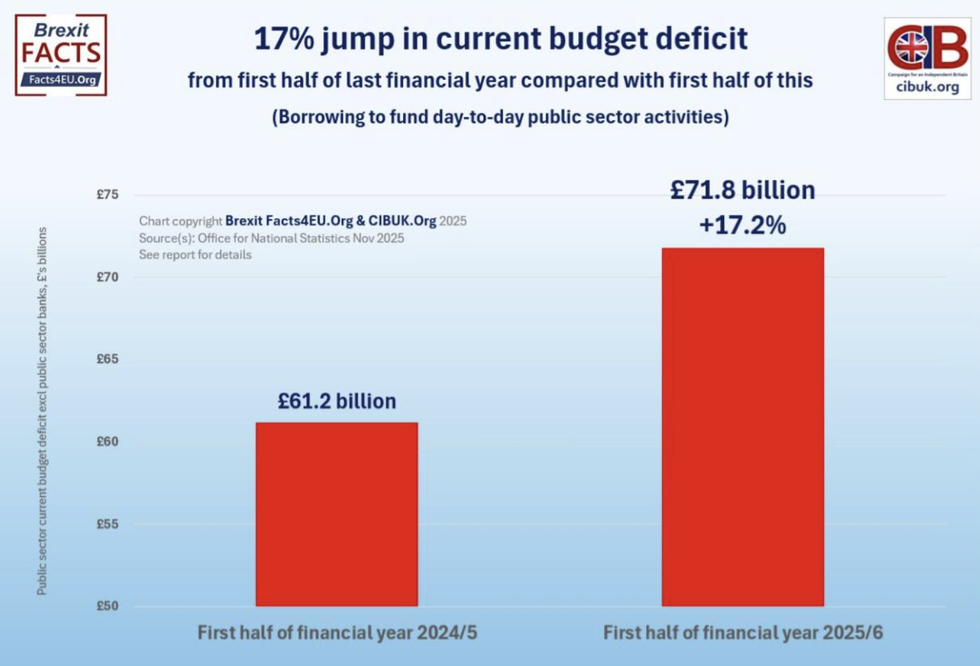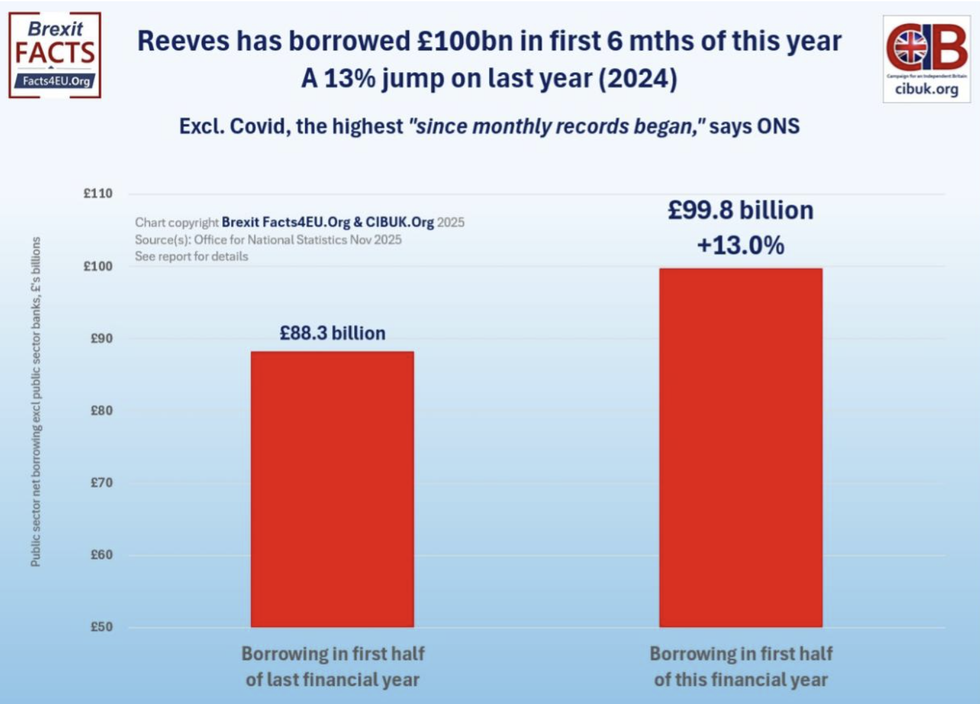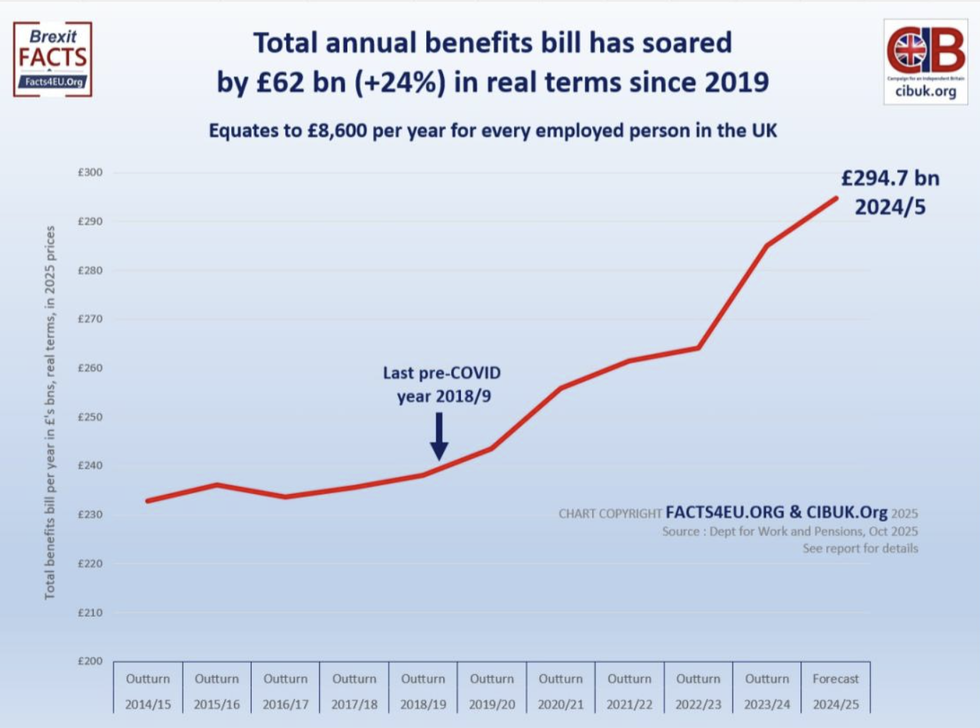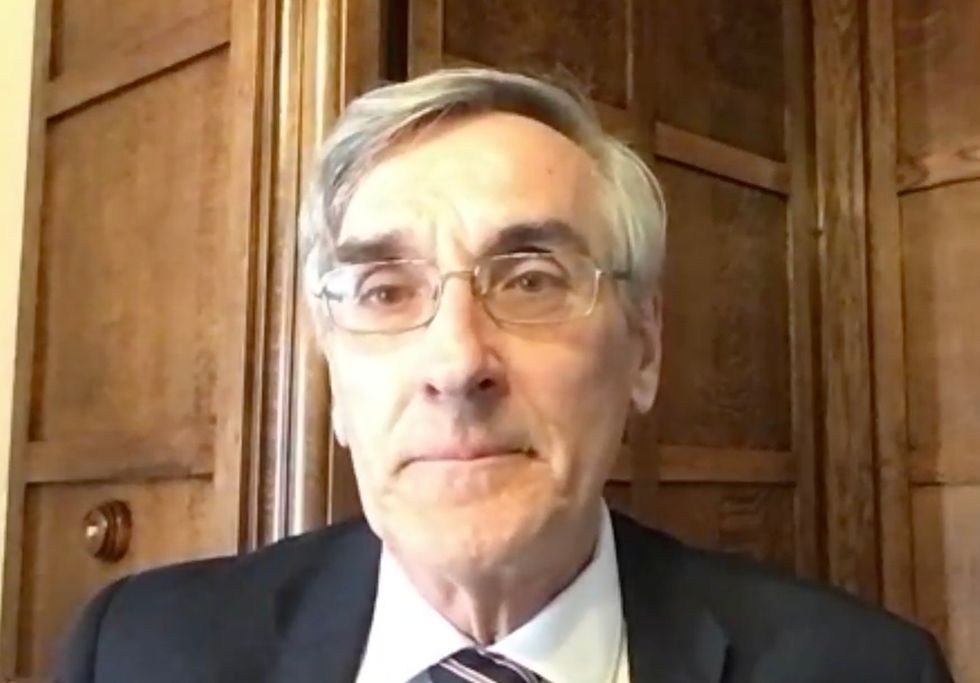Rachel Reeves has been issued with a devastating warning about a potential “economic Armageddon” as the Budget looms next week.
The Chancellor is widely expected to raise taxes on November 26 in order to fill a multibillion-pound gap in her spending plans.
Opposition politicians, think tanks and campaign groups have called on Ms Reeves to focus her plans on the wealthiest instead of pursuing broad-based tax rises.
Now, Facts4EU alongside GB News has broken down the charts ahead of next weeks’ much anticipated Budget.
While the overall national debt now stands at nearly £3trillion, the Office of National Statistics (ONS) pointed out Rachel Reeves had overspent by £13.4billion in September alone, bringing the total overspend for the first half of this financial year (April-September) to £71.8billion.
They said this equated to 17.2 per cent more than in the same six-month period of 2024.·
This growing deficit means Rachel Reeves is living on an ever-increasing overdraft, the equivelant of an overdraft of £2,100 for each employed person in the UK.
This is on top of mortgages, existing overdrafts, standing orders, direct debits, and credit cards.
Former senior Tory MP Sir John Redwood commented exclusively to Facts4EU and GB News: “Taxpayers are asking where does all our money go?
“Government wants us to believe it goes on the NHS and schools, but that’s just the minority.
“People paying too much tax often find they cannot get a GP appointment or are on a long waiting list for treatment.
“They see their local roads crumbling, and are told we are short of police and see their electricity and water bills soaring.
“Taxpayers get even crosser about higher taxes when the limited services they want to use are not there for them when they need them.”

Meanwhile, the ONS said Rachel Reeves’s “borrowing in the financial year to September 2025 was £99.8billion; this was £11.5billion (or 13.1 per cent) more than in the same six-month period of 2024.”
They go on to point out that with the exception of the Covid year of 2020, this was the highest borrowing “since monthly records began in 1993”.
Commenting on this, Sir John said: “The government has to keep putting taxes up to pay all the interest of the money it has borrowed.
“Just meeting the lenders’ demands costs government more than £100billion a year.
“That’s all money to pay for spending in previous years the state could not afford, before it pays any nurses salaries or mends a single pothole. We can’t go on like this.”
LATEST DEVELOPMENTS
- Rachel Reeves must ‘replace state pension triple lock’ and ‘prioritise the young for once’ in Budget
- I’ve added up Rachel Reeves’ taxes and discovered an extremely serious accounting error writes Nigel Nelson
- Politics LIVE: Just 1% of Britons think Labour is handling the economy ‘very well’ in shattering new poll

In just 15 months Rachel Reeves has increased British national debt by 6.7 per cent.
This means that each employed person in the United Kingdom owes £85,291, on top of their other debts such as mortgages, overdrafts, standing orders and direct debits, and credit cards.
Sir John Redwood said: “The government is plunging us all into debt. The government borrowings have reached a colossal £85,000 per worker as the government races to borrow more.
“That’s on top of the overdrafts, mortgages and credit people have taken out to support their own spending and to buy a house, car, or make other major purchases.”

On top of this, there has been a rapid rise in the amount being paid out in benefits to those unable to work, for whatever reason, has been the cause of much comment.
This rise been going on since the Covid lockdowns and shows no sign of stopping.
The disability benefit caseload has increased at a faster pace since the start of the Covid-19 pandemic, growing by 1.8 million claimants between May 2020 and May 2025.
The annual benefits bill has risen by around 24 per cent in real terms (after excluding the effects of inflation) since 2019.
It now totals nearly £300billion and is on course to exceed that in the financial year to the end of April 2026.
The benefits bill for the financial year 2024/5 (£294.7billion) equates to more than £8,600 per person employed in the UK.

Some final comments from the Rt Hon Sir John Redwood, exclusively for the readers of GB News, who said: “What could the government save money on instead of fleecing hard-pressed taxpayers more?
“Most of us do not want the Bank of England to be losing us £20billion a year on avoidable bond losses.
“We do not want UK industry destroyed by high carbon taxes and energy prices so we have to pay more in unemployment benefits to those who have lost their jobs through government folly.
“We do not want to pay enormous bills for migrants entering the country illegally to stay in hotels when we are promised government would smash the gangs.
“We do not want to be paying large bills in compensation because public services make too many expensive mistakes.
“For taxpayers to accept taxes government needs to deliver high quality value for money services. They should give it a try and spare us the tax rises.”
Our Standards:
The GB News Editorial Charter







Follow